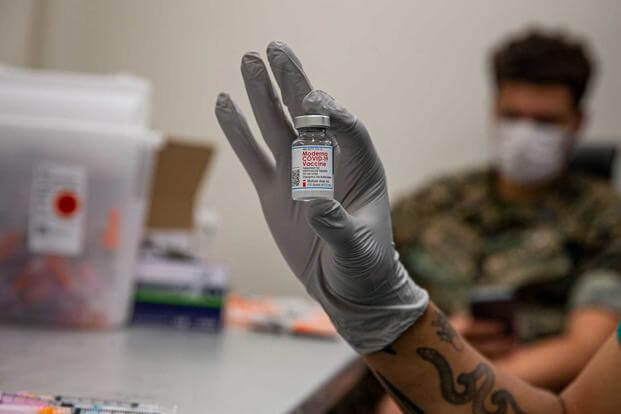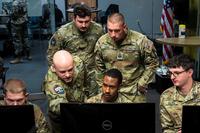The Marine Corps made headlines when it became the first military branch to grant three religious exemptions last month. However, according to a letter sent to Rep. Darrell Issa, R-Calif., all three went to Marines who were, functionally, no longer serving.
In a letter dated Jan. 21, J. J. Daly, the deputy legislative assistant in the Marine Corps' Office of Legislative Affairs, wrote that "in two cases, the Marines are on terminal leave and in the other the Marine has transitioned into ... a 180-day training program in private industry."
"The likelihood of their vaccination status impacting military readiness and health and safety was remote because the requestors are no longer serving with Marine Corps commands," Daly wrote.
Read Next: What's That Uniform the Navy's Top Enlisted Sailor Is Wearing?
The letter, released by Issa's office, comes after months of weekly updates from the military branches on their progress processing the thousands of filed religious exemption requests which, until the three from the Marine Corps, had resulted in no approvals. This led many vaccine refusers and their allies to allege the process was merely a formality.
A spokesman for Issa, Jonathan Wilcox, told Military.com in a phone interview that the review process is "contradictory" and argued that the Corps is not "reviewing these [exemption requests] independently and only on the facts" by noting that the letter said the three Marines' status in the Corps played a role in the decision.
Daly's letter explained that "the crux of the decision in the many denials and the few approvals has been the Marine Corps' compelling interest in readiness, and the health and safety of the force."
Wilcox argued that the letter shows that the trick to getting a religious exemption in the MarineCorps is "don't be an active-duty Marine."
Although the Marine Corps has been fairly tight-lipped about the impact COVID-19 is having on the force, generally releasing only force-wide infection totals, its fellow maritime service, the Navy, recently revealed that the danger from the pandemic continues to be ever-present and noted that the mandate has been key in keeping outbreaks on ships from having major operational impacts.
"When you weigh [the cost of retraining a new sailor] with the operational cost of having to tie up a ship due to, you know, medevac or whatever, it dwarfs it," Vice Adm. Bill Merz, the Navy's operations and strategy boss, told reporters last week when asked broadly about the costs of the service's COVID-19 policies.
"We have become very consistent at sea again, and I would tell you, if I had to put a dollar value on it, it's probably lower than it was a year ago because of the ability to be able to manage [COVID-19] at sea [and] return to normal operations," Merz added.
According to Wilcox, who says his office has spoken with "hundreds" of impacted military members, they are "hearing that this process is a sham review process ... and that the word is out: 'Nobody's getting those accommodations.'"
These concerns prompted Issa to contact Gen. David Berger, commandant of the Marine Corps, through a letter sent Jan. 17 asking for more information about the exemptions and the process.
The response letter from Daly confirmed their suspicions, Wilcox said.
One of the main points that many who have resisted getting the vaccine have raised as evidence of the pro-forma nature of the review has been what they say are nearly identical and superficial rejection letters to their requests.
In his letter, Daly admits that he is aware of the "dissatisfaction" from Marines that their letters were "not individually tailored to their request" but assured Issa that each request is reviewed by a review board, a legal adviser and a chaplain before heading to the deputy commandant for Manpower and Reserve Affairs for a decision.
A spokesman for the Marine Corps, Maj. Jim Stenger, also noted in an email to Military.com that "at every step, each accommodation request is given full consideration" but "every reviewer weighs the compelling government interest against the individual's request and the circumstances of their situation."
Daly goes on to say in his letter that he was "not aware of any case in which the adjudication authority has questioned the sincerity of a service member's belief.” But he noted that "this is a decision that requires consideration of factors that fall outside the expertise of a trained chaplain."
Issa's office has been seeking a pause of the vaccine mandate -- an effort that Wilcox says "was only strengthened by this letter." Issa and 14 other House Republicans separately sent a letter to the House Appropriations Committee on Wednesday demanding that funding to implement the mandate be blocked in any upcoming spending bill -- an unlikely prospect with Democrats in control of the House.
"I think the case for it, from our perspective, is stronger than ever," Wilcox said.
Editor's Note: This story has been updated, removing a reference to Gen. David Berger sending a separate response to Rep. Issa. The Marine Corps clarified that its statement referred to Daly's letter.
-- Konstantin Toropin can be reached at konstantin.toropin@military.com. Follow him on Twitter @ktoropin.
-- Rebecca Kheel contributed to this article. Rebecca can be reached at rebecca.kheel@military.com. Follow her on Twitter @reporterkheel.
Related: Inside the Secretive Networks of Military COVID-19 Vaccine Refusers












